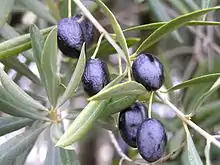γλαυκός
See also: Γλαῦκος
Ancient Greek

Grey olive leaves
Etymology
Uncertain origin. Barber reconstructs Proto-Indo-European *gleh₂w-ko-, noting that the root only appears in Greek (Homer, Aeschylus)[1], but Beekes finds an Indo-European origin unlikely.[2]
Pronunciation
- (5th BCE Attic) IPA(key): /ɡlau̯.kós/
- (1st CE Egyptian) IPA(key): /ɡlaʍˈkos/
- (4th CE Koine) IPA(key): /ɣlaɸˈkos/
- (10th CE Byzantine) IPA(key): /ɣlafˈkos/
- (15th CE Constantinopolitan) IPA(key): /ɣlafˈkos/
Adjective
γλαυκός • (glaukós) m (feminine γλαυκή, neuter γλαυκόν); first/second declension
- gleaming, bright
- blue-green or gray
- 406 BCE, Sophocles, Oedipus at Colonus 700–701:
- Χορός ... ὃ τᾷδε θάλλει μέγιστα χώρᾳ,
γλαυκᾶς παιδοτρόφου φύλλον ἐλαίας- Khorós ... hò tâide thállei mégista khṓrāi,
glaukâs paidotróphou phúllon elaías - Chorus: [a plant] that flourishes greatly in this land,
the leaf of the child-nourishing gray olive tree
- Khorós ... hò tâide thállei mégista khṓrāi,
- Χορός ... ὃ τᾷδε θάλλει μέγιστα χώρᾳ,
- (of an eye color) light blue or gray
Inflection
| Number | Singular | Dual | Plural | |||||||||||
|---|---|---|---|---|---|---|---|---|---|---|---|---|---|---|
| Case/Gender | Masculine | Feminine | Neuter | Masculine | Feminine | Neuter | Masculine | Feminine | Neuter | |||||
| Nominative | γλαυκός glaukós |
γλαυκή glaukḗ |
γλαυκόν glaukón |
γλαυκώ glaukṓ |
γλαυκᾱ́ glaukā́ |
γλαυκώ glaukṓ |
γλαυκοί glaukoí |
γλαυκαί glaukaí |
γλαυκᾰ́ glauká | |||||
| Genitive | γλαυκοῦ glaukoû |
γλαυκῆς glaukês |
γλαυκοῦ glaukoû |
γλαυκοῖν glaukoîn |
γλαυκαῖν glaukaîn |
γλαυκοῖν glaukoîn |
γλαυκῶν glaukôn |
γλαυκῶν glaukôn |
γλαυκῶν glaukôn | |||||
| Dative | γλαυκῷ glaukôi |
γλαυκῇ glaukêi |
γλαυκῷ glaukôi |
γλαυκοῖν glaukoîn |
γλαυκαῖν glaukaîn |
γλαυκοῖν glaukoîn |
γλαυκοῖς glaukoîs |
γλαυκαῖς glaukaîs |
γλαυκοῖς glaukoîs | |||||
| Accusative | γλαυκόν glaukón |
γλαυκήν glaukḗn |
γλαυκόν glaukón |
γλαυκώ glaukṓ |
γλαυκᾱ́ glaukā́ |
γλαυκώ glaukṓ |
γλαυκούς glaukoús |
γλαυκᾱ́ς glaukā́s |
γλαυκᾰ́ glauká | |||||
| Vocative | γλαυκέ glauké |
γλαυκή glaukḗ |
γλαυκόν glaukón |
γλαυκώ glaukṓ |
γλαυκᾱ́ glaukā́ |
γλαυκώ glaukṓ |
γλαυκοί glaukoí |
γλαυκαί glaukaí |
γλαυκᾰ́ glauká | |||||
| Derived forms | Adverb | Comparative | Superlative | |||||||||||
| γλαυκῶς glaukôs |
γλαυκότερος glaukóteros |
γλαυκότᾰτος glaukótatos | ||||||||||||
| Notes: |
| |||||||||||||
Antonyms
- (eye color): αἰγωπός (aigōpós), μέλας (mélas), χαροπός (kharopós)
Derived terms
- Γλαῦκος (Glaûkos)
- ὑπόγλαυκος (hupóglaukos)
- Γλαυκίππη (Glaukíppē)
References
- γλαυκός in Liddell & Scott (1940) A Greek–English Lexicon, Oxford: Clarendon Press
- γλαυκός in Liddell & Scott (1889) An Intermediate Greek–English Lexicon, New York: Harper & Brothers
- γλαυκός in Autenrieth, Georg (1891) A Homeric Dictionary for Schools and Colleges, New York: Harper and Brothers
- γλαυκός in Bailly, Anatole (1935) Le Grand Bailly: Dictionnaire grec-français, Paris: Hachette
- γλαυκός in Cunliffe, Richard J. (1924) A Lexicon of the Homeric Dialect: Expanded Edition, Norman: University of Oklahoma Press, published 1963
- γλαυκός in the Diccionario Griego–Español en línea (2006–2019)
- γλαυκός in Slater, William J. (1969) Lexicon to Pindar, Berlin: Walter de Gruyter
- Woodhouse, S. C. (1910) English–Greek Dictionary: A Vocabulary of the Attic Language, London: Routledge & Kegan Paul Limited.
- Barber, Sievers' Law and the History of Semivowel Syllabicity in Indo-European and Ancient Greek
- Beekes, Etymological Dictionary of Greek, p. 274-5
This article is issued from Wiktionary. The text is licensed under Creative Commons - Attribution - Sharealike. Additional terms may apply for the media files.